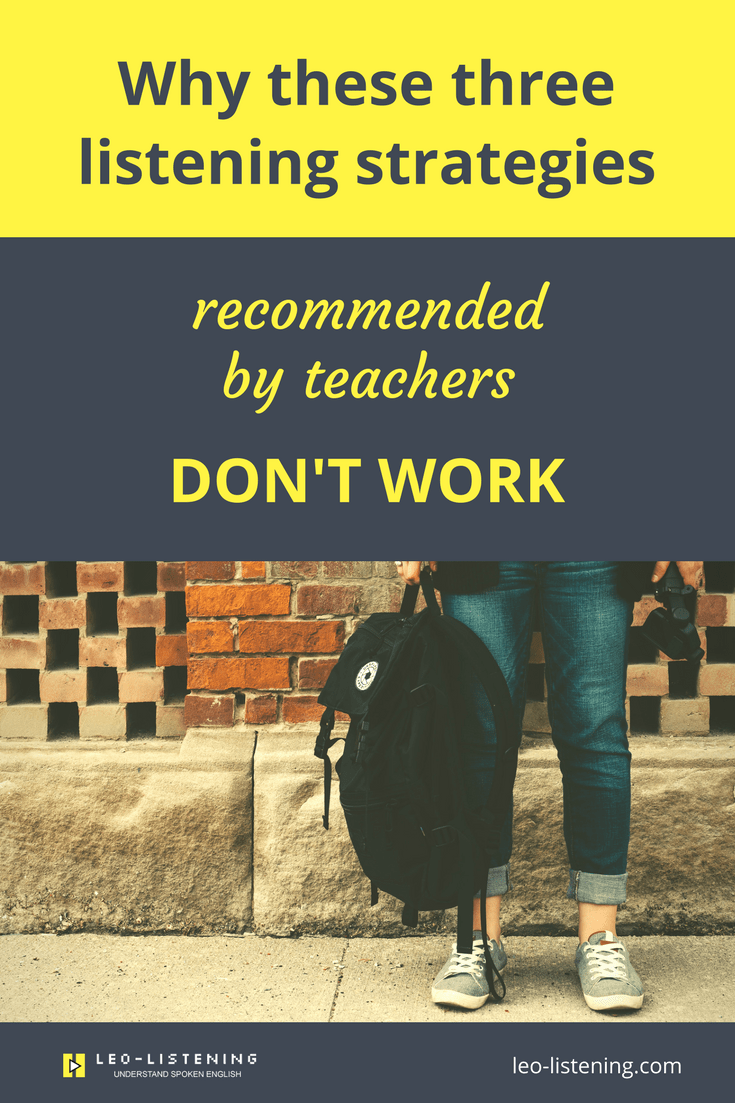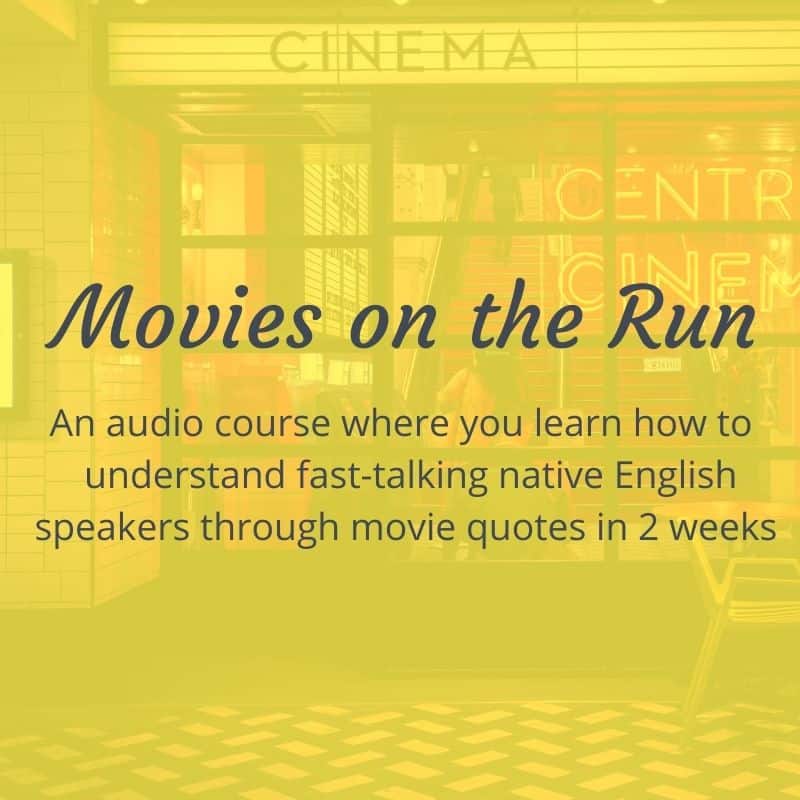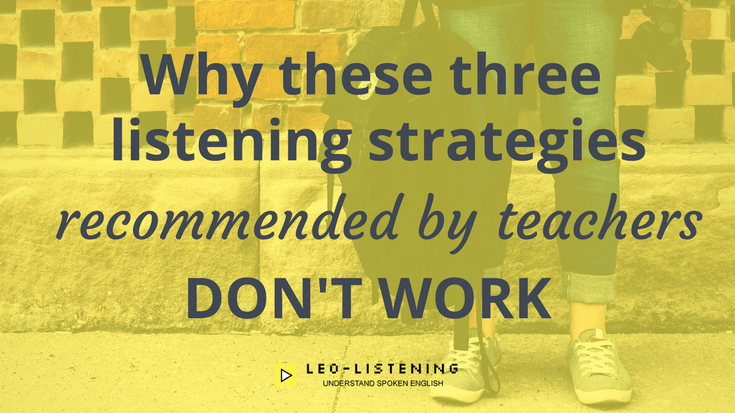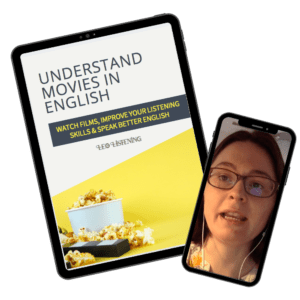Updated April 2022
Hi there Leo Listeners. It’s Cara here from Leo Listening, online English listening skills coach, and movie fan. I help adventurous expats and intrepid travellers harness their love of movies to understand authentic English, so they can connect with the cultures behind the films–and other movie lovers around the world.
So I’m talking a lot about basic listening skills – issues that you need to understand anything really. Not just films or TV series, but native speakers, conference calls, or whatever it is that interests you.
The core of the issue is that listening is quite a poorly taught skill. In the past, I didn’t teach listening. I tested it. I got my students to do multiple choice quizzes.
Listening to something in a class and then doing a quiz is not developing your listening skills. It’s simply a test of where those skills are at now. It’s not teaching you anything.
Because most teachers don’t teach listening and they don’t get you to actually improve those skills, what they do instead is teach compensatory strategies. These are strategies designed to make up for the fact that you can’t understand something.
So this is things like
- making predictions about what you’re going to hear
- guessing the meaning from context
- using visual clues to help you
These are all things that we do in our native language. It’s true. The thing is though, if you rely only on these types of strategies, and you never take the time to learn how words really sound when we say them fast, and how connected speech affects how words sound, you’ll never improve.

#1 Don’t Just Use The Context
The first of these strategies that we hear a lot about is if you can’t understand, use the context to guess.
I understand that. Guessing can help, but don’t rely on it, ok?
I’m going to show you some practical things that you can do to go beyond guessing.
Guessing from context could be things like using images – if it’s a film or series, you obviously have a lot of visual clues.
It could be the general context. You know that you’re listening to a conversation, so that gives you certain clues.
Or, it’s a weather report, so that gives you certain clues.
Another way is to use your real world knowledge or background knowledge of the situation. Fair enough.
The problem with all these scenarios is, what happens if you guess wrong? If you guess wrong and you can’t use enough of the actual audio to reinterpret your guess, you might misunderstand everything.
So rather than only relying or over relying on guessing, you’re going to have to listen to real native speech and come to terms with the fact that you’ll need to train your ears to catch many of the most common words.
You’re going to have to do things like dictations, shadow reading, repeating out loud what you hear, and using ear training websites. Sorry!
#2 Don’t Just Focus On The Stressed Words
Another compensatory strategy that we hear a lot about is just focus on the stressed words.
This is such common advice. A lot of teachers say “Don’t worry about every word. Just focus on the stressed words because that’s what native speakers do.”
Obviously, when English is your native language, it’s easy for you to say. And yes, native speakers don’t attend carefully to every single word.
But the reason that we don’t need to do that is because we can decode everything automatically and that’s the same for you in your native language too. You don’t pay attention to everything because your brain automatically decodes it all without any effort.
So if English isn’t your native language and you’ve been just listening and using this “focus on the key words” or “focus on the stressed words” strategy, you’re not learning how to decode speech.
By that I mean you don’t know how to decode all the unstressed words. These are all the little grammatical words in English that can be very difficult to catch such as auxiliary verbs, conjunctions and articles.
These words are important to the meaning. It’s not only stressed words that carry a lot of the message. A negative auxiliary can change everything in a sentence. “Can’t” rather than “can”. “Don’t” rather than “do”. It makes a big difference.
When I hear people learning English say “I only caught 50%”, it’s because you don’t know how to catch all these unstressed grammatical words.
At the same time, you also don’t know how words sound when they join together, when they blend together, when sounds disappear. That’s the idea of connected speech and it’s one of the keys to understanding all the details you’re missing and I’ll come on to it again in a second.
#3 Don’t Just Focus On The Meaning
Another thing that you hear that’s an example of compensatory strategies is to focus on the meaning, not the detail.
This is connected to the previous point. If all you do is focus on stressed words and guess from context, yes, you’ll probably get the overall meaning.
But the thing is, you’ll never understand the details of the message. You’re always going to feel a bit left out in the cold. Like somebody isn’t telling you something. Like you’re missing something. Because all the little words can make a big difference.
Here’s an example with the negative auxiliaries. When we make a sentence negative in English, we add a negative form, but it can be hard to catch. It can change sentences completely.
If somebody says to you “Oh you should come. You should come to the party”. That’s positive. But if someone says “you shouldn’t come”, and that negative auxiliary is hard to catch because I don’t pronounce the T sound at the end, that changes everything entirely.
They’re telling you not to come!
But you might not be able to catch the difference.
Many common expressions that you already know get modified in fast speech.
A really good example is questions.
- A question like What do you want?” is going to sound like “whadd’y’wan?”
- A question like “what’s that?” is going to sound like “whas’a?”
- A question like “where’s he going” is going to sound like “where’s’e’goin?”
So really quite different to what you might expect.
The good thing is once you know how all these little details, the auxiliary verbs, the prepositions, the articles are pronounced, you can start adding that type of pronunciation to your English to sound more natural. You can start using more contractions, more linking, and blending the sounds in the way that native speakers do.
Some more examples are sentences like We’ve done it”. So “we have” becomes “we’ve” and then “done” and “it” join together – “dunnit”.
Another classic is that H sounds tend to disappear on pronouns in English. So the classic example is “is ‘e busy?” So the pronoun “he” loses the H sound and then it joins with the auxiliary verb “is’e busy?”
Another one is “d’ya wanna?” So the question “do you want to” goes through a lot of changes. We’ve got a blend at the beginning and the “do you” becomes “d’ya”. We also lose the vowel of “do”. “Want to” becomes “wanna”, which is a really classic example of connected speech.
So a much better use of your time than just relying on all the compensatory strategies that you hear, that make you feel good, is to actually spend some time getting in to how English really sounds. Even if it’s hard. Even if it’s scary.
If you have any questions about this or any comments, please don’t hesitate to leave them. I’ll be with you again very soon. Hopefully I’ll hear from you.
Thanks again for reading!
Understand Fast-Talking Native Speakers Thanks To Movies

Fed up of watching movies with subtitles?
Feel nervous before you talk to a native speaker in case you don’t understand them?
“Movies on the Run” is an audio course that teaches you 10 English listening secrets that will help you understand native speakers when they talk fast.
Plus, you discover famous movies and the quotes that have become part of everyday speech and culture so you can fit in better. Find out more about Movies on the Run.



Hi Cara, great post with lots of valuable advice for students (and teachers!!!)
Thanks Bob!
could you make a list like those examples to help us
That’s a good idea! Otherwise, this post should help you: https://leo-listening.com/how-to-understand-native-english-speakers/